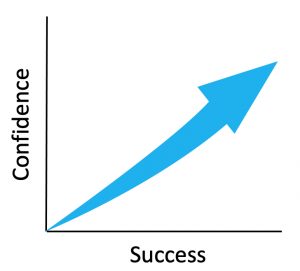There is a correlation between an individual’s confidence and their success and earnings? So, it makes sense that if you want to be successful, raise your status within an organisation or group, and increase your earnings you should turn your attention to developing and growing your confidence. And who doesn’t want to be confident, successful and earn more money, right!
As humans, we have an amazing ability to identify if someone lacks confidence. We can easily see the tell-tail signs of their nervousness when they speak, in the way they ‘carry themselves and how they cope under pressure or when they are challenged. This is certainly not how you want to be viewed if you are a leader and won’t instil confidence in your followers. Why is it then, some people exude confidence when others with similar experience, skills and knowledge struggle? Well, the answer may lay in whether or not they believe in themself. That’s right, no surprise! In order to develop self-confidence you first need to develop self-belief. Some of us have experienced a time when we were so sure of ourselves, so certain of our ability, that we could actually see an image in our mind of our success. When we reflect on that occasion, we recall everything just fell into place, a sense of momentum carried us forward and we felt an abundance of confidence. Unfortunately, many of us have much more experience where despite knowing what needed to be done and how to do it, we did not believe in ourselves and we lack the confidence to excel. We felt we were not up to the challenge and possibly like we were imposters and doomed to fail. This is the effect that having or not having self-belief can have on your confidence and a lack or abundance of confidence can have on your success.
Developing a strong belief in one’s self is both a process and a practice. I’m not talking about self-affirmation, although this can be a very powerful tool to get you over a hump or through a short-term challenge like an impromptu public speaking event. Developing a positive self-image and genuine belief in yourself requires self-awareness, self-reflection, honesty, and a genuine desire and the effort required to address any shortfalls.
An important distinction though. People often confuse self-belief with self-esteem and confidence, and these are not the same thing. Self-esteem is important. It’s how we see ourselves fitting into society, and according to Maslow, it’s a higher order need. It is, however, possible to have high self-esteem but low confidence. For example, you can ask someone if they are a good person and they may say ‘yes’ but if you ask them “are you really a good person” they might say ‘I’m not that sure that I am”. This might indicate a low level of confidence in their own self-image. Inversely you could ask someone what kind of person they are, and they may say “I’m a terrible person”, and if you ask them are they sure, they may say ‘yep, I’m certain that I’m a terrible person. Therefore, they have a high degree of confidence in their low self-esteem. The risk here, is they may be confident about negative aspects about themselves and that’s not good. This is particularly worrying if the person’s self-image is very bad and their confidence in that self-image is very high, as it could lead to self-harm or worse.
So, it’s important that we understand that confidence, self-belief and self-esteem are not the same things and being confident in your negative self-image or self-belief will have a corresponding negative impact on your performance.
It doesn’t just matter what you think, it also matters what you think about what you think!
The relationship between confidence and success is best shown graphically.

The evidence that confidence is critical to success is irrefutable. As confidence rises so does success. The question then is how to build your confidence?
A good start is to develop a positive self-image and belief in yourself. Your own positive view of your self-worth, your value, your ability, and your place in the universe (status) all influence your self-belief, which in turn will underpin and bolster your confidence. It may well be that one of the most important investments you ever make is in your own self-belief, so it is well worth allocating regular periods of time to work on your self-image and self-belief.
Probably the best example of the benefits of positive self-belief is the impact that “positive-discrimination” has had on the success of females in leadership roles. Whilst males and females are very different in terms of physical attributes and emotional response, they are both equally capable of leading people and organisations and perform better or worse depending on how those they lead need to be led. In recent years women have experienced a significant amount of positive affirmation through government policies, educational institutions, social media and so forth. This has helped catapult them into leadership roles that 20 or 30 years ago would have seemed out of their reach. The effects of gender based positive discrimination has; however, also had the inverse, negative effect on males and stereotyping such as labelling normal masculine traits as “toxic masculinity” has impacted on how men view themselves.
This is a simple example of how manipulating people’s self-belief can have a positive or negative impact on their performance, their desire to strive to achieve and on actual outcomes. In this example, neither men or women are any better or worse at leading, just different. The development of self-belief has allowed women to have the confidence to challenge the status quo and rise to meet the challenge.
